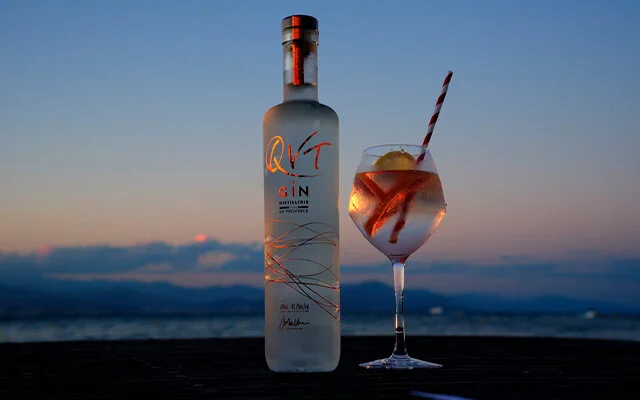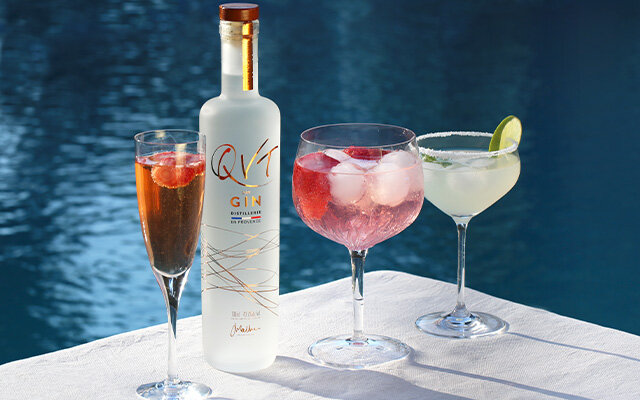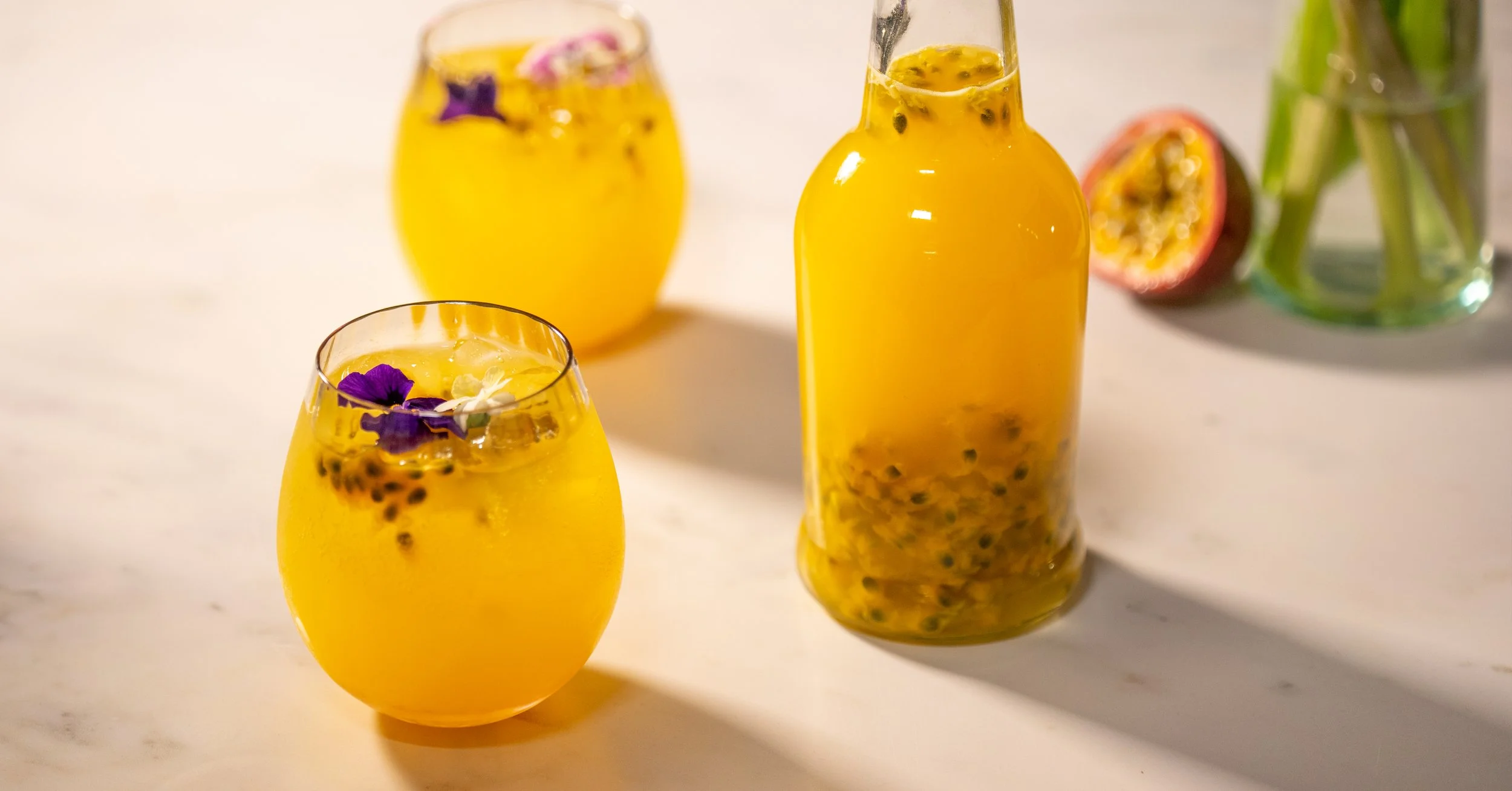Husband-and-wife duo Justin and Anna-Carin Kandimaa Matterson have travelled far and wide, but nowhere in the world captured their imagination quite like Provence, France.
Find out how that bountiful region inspired them to craft the bottle of QVT Dry Gin Édition CGC that arrived in our April 2021 Gin of the Month box – a spirit that captures the region’s unique blend of tradition and avant-garde.
QVT Dry Gin Édition CGC
Distilled in Provence, France, exclusively for Craft Gin Club members
40% ABV
Botanicals:
Juniper, coriander, cardamom, rose petal, cornflower petal, lavender, rosemary, thyme, lemon, grapefruit, rosé extract and polypody fern.
Tasting Notes:
Refreshing notes of piney juniper can be found on the nose and palate. They are followed by delicate floral and herbaceous flavours and fresh bursts of citrus which continue onto the well-rounded finish, with delicious, long-lasting Provençal notes.
Spirit of Provence
Provence is the home to many picturesque villages, towns and cities
When Anna and Justin arrived in Provence they fell head over heels in love with the region. Following in the footsteps of avant-garde pioneers Pablo Picasso, Vincent van Gogh and Henri Matisse, they discovered a wealth of inspiration in the land of lavender fields, olive groves, historic villages and vineyards.
While Provence had inspired artists and poets of old to pick up their paints and pens, Anna and Justin instead decided to launch a distillery and to use botanicals to capture the essence of the region.
Named after Quatre-Vingt-Trois, which translates to 83, QVT Distillery pays homage to the area code where it can be found – right in the heart of Provence.
But how exactly did Anna and Justin come to craft a gin in a region where wine and pastis have reigned supreme for centuries? The story actually begins thousands of miles away, with sundowner G&Ts sipped in Zambia.
Anna, Justin and their two daughters
From Africa to Provence
Justin was born and raised in England, but he’d always felt the urge to go out and discover for himself just how wide and wild the world was.
“I moved to Africa in the early 1990s on a three-month contract and left almost 20 years later.”
During his time there, he lived in Zambia, Zimbabwe, Kenya, South Sudan, Uganda, Somalia and beyond, at first creating safari lodges and later working as a contractor for the UN and the US State Department.
It was while he was creating a safari lodge in the Zambian bush that he first met Anna, a Swedish health economist who was working to develop health systems across the continent.
It wasn’t long before Anna and Justin realised they shared more than just a taste for sundowner G&Ts – a staple tipple of safari lodges – though they enjoyed their fair share of those, too. Even though they came from very different walks of life, they recognised kindred spirits in one another.
And so, the young couple soon embarked on a life together – one that took them travelling across the continent everywhere from Nairobi to Khartoum. Along the way they welcomed two daughters into the world, to tag along with them on their adventures.
“We had a lot of different adventures during that chapter of our lives. But then when the kids got to the ages of five and seven, we thought maybe it was time to rethink our lifestyle, which involved moving around a lot and living in places with potential dangers.”
The Matterson family first spent a stint in Geneva where Anna took a job with Gavi, an organisation that rolls out vaccines to developing countries. But it wasn’t long before they realised that Switzerland wasn’t the home they were looking for.
Once again it was time to make a move. Sweden and England were off the table – both Justin and Anna wanted to put down roots in neutral territory. That’s when Provence presented itself as a possibility. They had both spent time in the region in their youth, and, a couple of decades later, they could feel themselves gravitating back there.
“We decided to visit Provence – and as soon as we got there, we realised that it was where we needed to be. This was where our heart was. In an odd way, it evoked a lot of the same feelings that our life in Africa had. It’s a little bit rugged, and has this intense natural beauty that made us feel right at home.”
Provence is famed for its lavender fields
From its natural beauty to its rich cuisine and history, Provence had everything Justin and Anna could ever wish for. Well, almost everything. There was just one key thing missing.
“When we arrived in 2013 it was actually quite difficult to go into a bar and order a G&T, as many places would just serve wine or pastis.”
It seemed strange that in a region so steeped in history and avant-garde ideas, gin was conspicuously absent, especially given the emerging gin renaissance and the fact that gin was fast becoming a spirits category famous for its innovation. While now a few gins have appeared in Provence, in the early 2010s no one had thought to distil one there.
One night, looking over a menu where gin was sorely lacking, Justin and Anna began to hatch a plan.
“It was a fortuitous moment. While it took until the beginning of 2019 for us to actually begin distilling, once the idea was planted there was no turning back.”
The Art of Distilling
Anna happily at work at the still
To build something special and long-lasting, Justin knew the importance of research. Over the next five years, he studied distilling and sought out the finest stills in America, Germany and the UK. When the time came to create a still of their own, he knew exactly where to turn.
“To create our still we worked with a family-owned firm in Germany called CARL. They’ve been making stills since the middle of the 19th century, so they really know what they’re doing. There are only two or three firms in the world with this kind of know-how, so it’s a real pleasure to have one of their stills.”
Working closely with Justin and listening to his vision, Alexander Plank the CEO at CARL, designed a bespoke hybrid still that would empower Justin to experiment with different distilling techniques.
A mammoth beast forged from copper and stainless steel, complete with a 600L pot, a six-plate rectification column and a botanical basket, the QVT still is incredibly versatile. While it can be used to distil extraordinary gins, it can also distil vodka, absinthe, brandy, rum, wine and more. For Justin, it offered the promise of innovation, and the capacity eventually to put all the ideas bubbling away in his head into action.
Over the 18 months it took to craft the still, Justin began developing the recipe for their signature gin. It wasn’t just a matter of scouring Provence for the very best botanicals to experiment with – he also wanted some serious expertise on his side. After all, if he was going to put his own spin on gin, he needed to understand the spirit inside and out.
He turned to Dr Klaus Hagmann for advice. Something of a modern-day alchemist, Klaus has over 30 years of experience in distilling and a long history of sparking creativity in up-and-coming distillers.
While developing their gin recipe, Justin and Klaus turned to the region’s long tradition of winemaking. Home to some of the finest wineries in France, Provençal wines are famous the world over for their goût de terroir – which translates as the ‘taste of the land’. To put it simply, terroir describes everything from the soil to the climate in which grapes typically grow, and how these elements affect the wine’s character.
Justin decided to follow in the footsteps of Provence’s winemakers and to apply the same principles to gin. He turned to Provence’s natural larder and selected botanicals that could either be sourced locally or had historically grown in the region. Immediately, herbs such as rosemary and thyme and flowers like lavender and rose – which Provence happens to have in abundance – stood out.
Once the still finally arrived, Justin was keen to get started. After creating the first batch of QVT Dry Gin, Anna and Justin bottled the liquid. It was the moment of truth.
QVT Dry Gin was a dazzling success, winning a Double Gold at the SIP Awards in the US, a Gold at the London Spirits Awards and a Gold at the CWSA in Hong Kong.
QVT Dry Gin
Spring Forward
Never ones to rest on their laurels, Justin and Anna were keen to keep their momentum going. When Jon and John asked them to craft a special edition for Craft Gin Clubbers, they got right to work.
While they wanted to create something with a strong family resemblance to QVT Dry Gin, and for it to share the same goût de terroir, the special edition gave them the chance to reimagine their signature flavours for a fresh season.
“Because we knew Craft Gin Club members would receive the gin in the spring, we wanted to lighten our original liquid by adding a touch more citrus and paring down some of the more intense herbal and floral notes. That way, we could keep the authenticity and complexity, but at the same time offer something light and fresh that’s perfect for spring and summer sipping.”
Provençal botanicals
After countless hours spent trying to get the balance and ratios of the recipe just right, Justin and Anna found themselves sitting before two tasting glasses of the liquid. They took a long sip and looked at each other. All their hard work had paid off – the flavours came together in a harmonious blend, one that would whisk drinkers off to springtime Provence.
“This has been a real project of passion for us, and we’re really proud of what we’ve made. Provence is such a uniquely rich region – the abundance of botanicals makes it such an interesting place to make gin – and to be able to give people a taste of Provence is so special.”
More Adventures to Be Had
QVT cocktails
Now that Justin and Anna have crafted two spectacular London Dry Gins, they’re branching out and experimenting. Here are some tipples you might just see coming out of QVT Distillery in the coming years.
Vodka
Anna and Justin aim to make a vodka that, just like the gin they’ve crafted, is of an international standard while also having a Provençal twist.
“The French drink a lot of vodka, so we’re being asked by our friends and neighbours to make one for them.”
Absinthe
Nicknamed ‘the green fairy’, absinthe is an aniseed-flavoured high-ABV spirit that was a favourite amongst avant-garde artists such as Pablo Picasso and Vincent van Gogh.
“We like using a drop or two to flavour a Gin Martini, and we like creating products that complement each other.”
Pink Gin
Justin and Anna would like to make a naturally pink gin using the colouring from wine grapes, as opposed to artificial colouring.
“We’d only be able to make it for one month of the year, when the harvest comes in, so it would be really special.”
Eau de Vie
Eau de vie – which literally translates as the ‘water of life’ – is a clear, colourless fruit brandy (made with fruits other than grapes) crafted using processes of fermentation and double distillation.
“In Provence you used to see the bouilleur de cru – that is a mobile still – quite commonly. It would travel around the region after harvest and the local farmers would bring along their fermented fruit, which the still would distil into eau de vie. The farmers would go home with flagons of the stuff that would last them the winter. This community endeavour has all but disappeared, but we hope to offer the service again one day.”
Marc
If you’ve ever enjoyed a glass of grappa, marc would also be to your taste. Like grappa, it’s made using the alcoholic grape skins that are left over from the winemaking process.
“Not every vineyard can make its own, so the pomace (the leftover grape skins) is often collected and sent somewhere that it can be transformed into marc. Slowly but surely, we hope to be able to offer this service. We are gin makers, but we also want to contribute to the community and the traditions of Provence.”
Anna and Justin in their distillery




















 plus all of your
plus all of your
 See Bronze Benefits
See Bronze Benefits
 plus all of your
plus all of your
 See silver Benefits
See silver Benefits
 plus all of your
plus all of your
 See gold Benefits
See gold Benefits